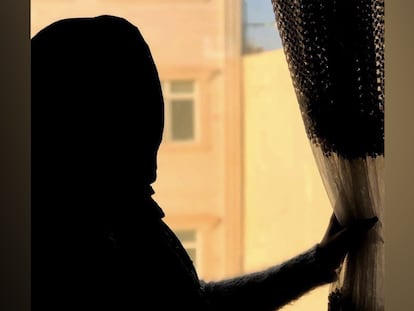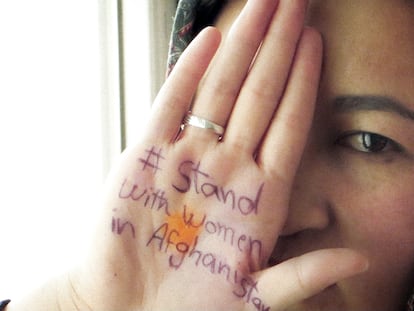Begum TV, a school for Afghan women banned from accessing education
Journalists broadcasting from Paris are sidestepping Taliban restrictions to connect girls in their home country to learning, health advice and entertainment
Wajiha Wahidi, a 25-year-old Afghan journalist, retouches her makeup before recording her first broadcast from the Begum TV studio in Paris. The premises, located in a northern neighborhood of the French capital, include a small newsroom, a recording studio and a meeting room, currently being fitted out with a green screen so that two programs can be filmed simultaneously. This expansion reflects the growth the Afghan television station-in-exile is experiencing, one year after its creation. Like the rest of her fellow journalists, Wahidi does not wear a veil and appears on-screen in street clothes, her face uncovered. She looks quite different from her audience of Afghan women. They watch her broadcasts via satellite television, which reaches one in two households in Afghanistan, a country ravaged by poverty where more than half of its 42 million inhabitants depend on humanitarian aid for their survival.
Wahidi worked as a journalist on national TV and radio stations before leaving Afghanistan in 2022, nine months after the Taliban regained power. After passing through Pakistan, she arrived as a refugee in Paris at the end of 2023 with support from Reporters Without Borders. Every one of the dozen journalists who work at Begum TV today are refugees. Their mission is crucial so that the 1.4 million girls who, according to UNESCO statistics, have been forced to stop attending school at the order of the fundamentalist regime, can continue to have some kind of access to education. It’s also important to the millions of women who have been expelled from universities and public-facing professions. Begum supplies them with information, psychological support and entertainment.
Since their return to power, the fundamentalists have put out more than a hundred decrees that have progressively eliminated the presence of women in society and the workforce, depriving them of their pastimes and massively restricting their movements. The United Nations has stated that its ban on education for girls over the age of 12 is globally unprecedented, and that the Taliban regime has installed gender apartheid, amounting to a persecution of Afghan women.
Wahidi’s sisters are a clear example of this violation of rights. Her older sister had to quit university just one year shy of graduating with a medical degree. Now she is married and the mother of two children. “She has psychological problems. Becoming a mother hasn’t been easy for her. She wasn’t prepared to be a housewife,” says the presenter, who is fighting to bring two of her three younger sisters, who have all been out of school for two years, to France. The third is already engaged, having decided to follow in the footsteps of their eldest sister.
“In Begum TV, I’ve found family again and I feel that I’m doing something useful for Afghan women,” says the journalist. Her work is bringing her out of the depressive episode of her exile, though it is also putting her loved ones in danger. Her father has been detained by the Taliban on various occasions and interrogated over his daughter’s unveiled appearances on the foreign TV channel.
Begum TV was launched in Paris by Afghan journalist Hamida Aman in March 2024, with economic support by the French Foreign Ministry, the United Nations and other public and private donations. It has become an escape route for millions of women in Afghanistan.
The international community is more worried about security, immigration and drugs than human rights. All the pressure and interventions over the last four years have been useless, neglect has taken holdHamida Aman, Begum TV founder
In just over a year, Begum TV has made 8,500 videos in Pashto and Dari available to Afghan women, including an entire school curriculum. This mission was begun by Begum Radio, which broadcasts from Kabul, expanding into television due to the importance of visuals in subjects such as science and mathematics. “80% of our content is educational. From 7 a.m. to 1 p.m. we broadcast classes. In the afternoon, there are entertainment programs and from 6 p.m. on, primetime produced in Paris with psychological support, health advice, music and entertainment programs,” says Aman. She also makes the shows available on the Begum Academy website and via a mobile application. “The goal is to get to the maximum number of women possible,” she says. They also broadcast some dubbed news reports provided by French television, in addition to music and series that are not allowed in Afghanistan.
“If the radio ceases to exist, our battle on TV will be essential”
Many women are depressed by the lack of perspective for their children and for themselves. They all talk about the same problems, insomnia, loss of appetite, depression and suicide, especially the younger onesHamida Aman, Begum TV founder
Aman seems one step ahead of Taliban logic. Perhaps that’s because she knows it so well. Her family fled to Switzerland when she was eight years old, in the 1980s. She returned in 2001 as a journalist, to cover the U.S. invasion after the September 11 attacks, and decided to stay to connect with her roots and work for her country. She remained there until moving to France in 2015. In March 2021, months before the Taliban took power, Aman created Radio Begum Kabul. “I thought it was important to prepare for the arrival of the Taliban by making a radio station that was just for women, defending the rights that had cost us so much to get, to have a radio station that we could run if they banned us from working, which became a reality,” she explains.
According to Reporters Without Border, “more than 80% of Afghanistan’s women journalists have had to stop working since 15 August, 2021.” The few who continue have had to do so amid constant threats, fear and censorship, continues the 2025 report. In the majority of the country’s regions, women reporters cannot attend press conferences, interview men or show their face in public. One of the fundamentalists’ most recent directives even bars women’s voices from being heard in public places. The enforcement of these regulations, according to Afghan women reporters who remain active, largely depends on the interpretation and disposition of local authorities, but their activity is subject to strict norms and carried out in terror.
“My fear is that this will spread throughout Afghanistan, which is why I believe that the presence of television is even more justified,” says Aman.
Up until December, Aman regularly traveled to Afghanistan to understand the situation on the ground. She had plans to travel once again to Kabul in February, but a week before the trip, the Radio Begum location was tracked and closed by local authorities. Paradoxically, on March 15 the government re-authorized the radio station’s broadcasts, which continue to be emitted from Kabul, though under heavy restrictions. “There is a lot of pressure on media that is directed at women,” says Aman.
For the women who run Begum TV, the hardest part is the normalization of Afghanistan’s new reality. “Many people already assume that, from the age of 12, girls will have to stay home,” says journalist Saira Akakhil, who has hosted a health program for the past seven months that features medical specialists discussing breast cancer, menstruation and other taboo topics. The show also features live psychological consultations and fields calls from people who simply want to vent.
I know I’m putting my family who is still there at risk, but why should I remain silent? As a person, as an actress and as a woman, I can’t remain silentMarina Gulbahari, actress and presenter on Begum TV
Internet and satellite television, which is impossible for authorities to control, has become the primary form of resistance for women who remain in the country. “Progressively, we’re going to get more and more direct calls and questions from viewers, just as we have on the radio. Many women are depressed by the lack of perspective for their children and for themselves. They all talk about the same problems; insomnia, loss of appetite, depression and suicide, especially the younger ones,” says Aman, who like the rest of the journalists interviewed, is pessimistic about the future. “The international community is more worried about security, immigration and drugs than human rights. All the pressure and interventions over the last four years have been useless, neglect has taken hold,” she says. Aman still hopes that the international community doesn’t decide to isolate Kabul, an attitude that her opinion, would turn its population into hostages of their current situation.
Marina Gulbahari spent years in a depressive state that she has left behind thanks in large part to her work at Begum TV. In Afghanistan, she had been a movie star since she was a young girl, but she started receiving serious threats after an unveiled appearance at a festival in Korea, after which she decided not to return to the country. She’s spent the last year in France, where she was offered asylum. “I love what I do, I feel that my program brings happiness to those who remain in Afghanistan and changes their perspective,” she says, referring to the music program she directs. She also conducts interviews with other Afghan women, which she wants to remind girls who remain in the country that there are other ways of life besides the one preached by the ultra-conservatives. “I know I’m putting my family who is still there at risk, but why should I remain silent? As a person, as an actress and as a woman, I can’t remain silent,” she says.
Sign up for our weekly newsletter to get more English-language news coverage from EL PAÍS USA Edition
Tu suscripción se está usando en otro dispositivo
¿Quieres añadir otro usuario a tu suscripción?
Si continúas leyendo en este dispositivo, no se podrá leer en el otro.
FlechaTu suscripción se está usando en otro dispositivo y solo puedes acceder a EL PAÍS desde un dispositivo a la vez.
Si quieres compartir tu cuenta, cambia tu suscripción a la modalidad Premium, así podrás añadir otro usuario. Cada uno accederá con su propia cuenta de email, lo que os permitirá personalizar vuestra experiencia en EL PAÍS.
¿Tienes una suscripción de empresa? Accede aquí para contratar más cuentas.
En el caso de no saber quién está usando tu cuenta, te recomendamos cambiar tu contraseña aquí.
Si decides continuar compartiendo tu cuenta, este mensaje se mostrará en tu dispositivo y en el de la otra persona que está usando tu cuenta de forma indefinida, afectando a tu experiencia de lectura. Puedes consultar aquí los términos y condiciones de la suscripción digital.

